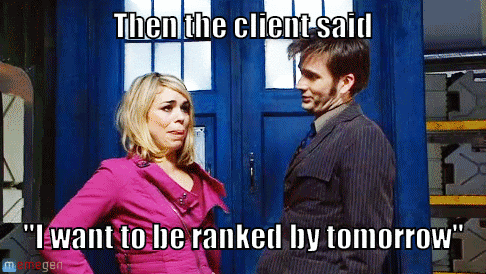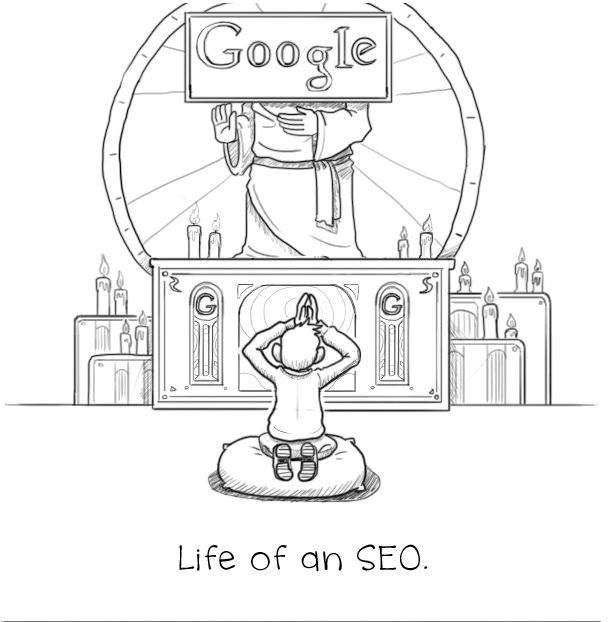
There are two clear options when it comes to search engine marketing. You can engage in search engine optimisation (SEO) and/or pay-per-click (PPC) campaigns. Most of the time, the question is asked in such a way that you have to choose between one and the other.
But should that be the case?
SEO and PPC each comes with their own pros and cons. We’ll have a look at both of them here.
Pros of SEO
Credibility
The top few organic results are immediately seen as more credible. Firstly, most consumers know that the top few results are paid ads so they tend to be more wary. Secondly, there seems to be a general assumption that Google returns the ‘best’ (as opposed to most optimized) results in the first page.
Research also suggests that up to 86% of Internet users trust organic SEO listings more than paid listings.
High Potential Returns
Organic search results typically attract more clicks and traffic than paid ads. Unlike PPC, where your traffic ceases when you stop paying for ads, SEO will continue drawing increasingly more traffic over time as your domain increases in authority.
Furthermore, the cost-per-click (CPC) in countries like Malaysia will continue to rise as more people get on the pay-per-click bandwagon. While you might get certain advantages if you continuously run PPC campaigns (for example, a lower CPC due to a better Quality Score), these might not offset the general increase in prices.
As an illustration, CPC in Singapore for the commercial real estate industry was as low as MYR0.30 less than a decade ago. Right now, it hovers around MYR30 per click. The same will probably happen in Malaysia.
If you start SEO today and successfully build an authority website, your competitors will have a hard time dislodging you from the first page of the SERPs, provided that you continuously maintain your SEO efforts.
Exposure on Several Search Engines
While not all search engines are built the same way, optimizing for one will generally result in an increase of traffic from other search engines as well.
Consistent Results
If your keyword research was spot on and you have successfully achieved your SEO results, you can expect to benefit from a consistent flow of traffic. As long as you don’t slack off your SEO efforts, this traffic will continue to remain stable.
SEO Activities have Benefits on their Own
In the past, SEO was perceived as a somewhat of a black box – no one really knew what SEOs did to increase keyword positions. Its technicality was beyond the grasp of mere marketers and as a result, SEO was siloed away from the other marketing functions.
Fast forward to 2014, and you will find that the critical success factors (CSFs) to SEO dominance are beginning to sound very much like good marketing.
You now need to create quality content to increase awareness and discoverability by both human users and search engines, increase social signals for social proof, build a website that is easy to navigate for both robots and human users, increase brand mentions for credibility, and so on.
Of course, SEO still has its esoteric parts, but most of the tactics you would execute in a successful SEO campaign would have merit even if they were done in the name of branding, or thought leader, or good old marketing.
Cons of SEO
Good SEO Takes Time
 SEO has a long gestation period compared to PPC. Quality SEO cannot occur overnight – it takes time, and you should be wary of any SEO company that promises results in a week. It takes many months to fix your website’s technical issues, create quality content and build relevant, authoritative links.
SEO has a long gestation period compared to PPC. Quality SEO cannot occur overnight – it takes time, and you should be wary of any SEO company that promises results in a week. It takes many months to fix your website’s technical issues, create quality content and build relevant, authoritative links.
Hyper Competition in Some Verticals
Some keyword verticals and business categories are highly competitive. Unless you have an enormous budget, you do not want to target keywords such as ‘iPhone 6’. You might find yourself fighting an uphill battle against large companies with a seemingly bottomless pocket.
No Guarantee of Results
Yeah, yeah, I know there are some companies out there that ‘guarantee’ SEO results. As usual, I’ll be directing you to Google’s Webmaster Guidelines that state ‘No one can guarantee a #1 ranking on Google.’
A guarantee for rankings in the context of SEO is meaningless. The simple fact is that they cannot guarantee rankings because it is out of their control. You can be guaranteed of due diligence, but not of rankings. For example, when you buy an oven, you’ll get a warranty or guarantee that it will work for the next year. But you won’t get a guarantee that you will become a Michelin Star chef.
Even if they do return you your money, you would have wasted all that time on a non-performing channel. You’re going to have a hard time explaining that to your boss.
At the end of the day, SEO can be riskier than PPC, so it definitely is not suitable for companies that are betting the farm on getting organic traffic.
Susceptible to the Whims of Google and Bing
Algorithm changes are what keep SEOs up at night. White hat link building methods of today can be the black hat poster boy tomorrow (as what happened to guest posting).
This is a key reason why you should choose a SEO company that has the capability to execute in content marketing initiatives and create social engagement rather than just plain old link building. White hat SEO will vaccinate you from the harsh sting of Google updates, but only the most naïve SEOs will claim that you are immune.
Credit: SkilledUp
Pros of PPC
Instant Traffic
It doesn’t take long to sign up for a Google AdWords account, and your ad will appear on the top of the SERPs almost immediately after you set up your pay-per-click campaigns. Think of pay-per-click (PPC) as a tap – you turn it on to get traffic instantly and can turn it off whenever you want. Compare this to SEO, where it might take months to build authority and relevancy for your website.
Full Control
The level of granularity in ads management platforms such as Facebook Ads and AdWords is astonishing. You are in complete control of who you want to target, where your ads should be shown and when you want them to be published. There is no minimum spend or long term contracts.
Not Susceptible to Algorithm Updates
You don’t have to worry about any changes to search engines algorithm. An unexpected update won’t suddenly make you lose all your traffic and put your business at risk.
Better Sales & Budget Forecasting
You know how much you have to spend to get a certain amount of traffic. You can manage your budget and measure your ROI much more easily with PPC. When you add PPC to your operational budget or ongoing marketing expenses, you can be assured a steady and predictable stream of traffic.
If you have ever tried growing a business or been in charge of a strategic business unit’s P&L, then you will appreciate the importance of stability and predictability.
Hyper Targeting
You can decide exactly where and to whom you want your ads to be shown. Facebook ads even allow you to target potential customers according to their hobbies and interests.
Allows You to Test Assumptions Immediately
There is no sure thing in business, only assumptions. You need to be able to test and validate those assumptions quickly before you jump in with both feet.
Let’s say you want to release a new offer across Malaysia but you’re not sure if it will resonate with your target audience. You can create a landing page for the offer, buy targeted traffic via PPC and measure the results.
SEO does not give you this option as it takes months to gain enough traffic.
Go National, Regional or Global Quickly & More Cost-Effectively
Expanding your business to other geographic locations is usually part of your business roadmap. With PPC, you can test the market and advertise to different geographical areas. This is much cheaper than opening a regional office and staffing it.
Better Visibility than Organic Results
Paid search results are typically shown at the top of the SERPs, above the organic search results. This equates to better visibility. Even if you’re ranking number one for your targeted keyword, you’re giving up this space to your competitors if you’re not doing PPC.
High Clickthrough Rates for Commercial Searches
While the overall traffic is less, research suggests that 50% of visitors arriving from paid ads are more likely to buy than those who came from an organic search.
Keyword-Level Data Still Available!
Around a year ago, Google made the switch to encrypted search results. This means that we no longer have access to which keywords searchers used to find your website from organic search. However, we still have that data for Google AdWords.
Cons of PPC
Potential to be More Expensive
PPC has the potential to be very expensive. If you’re a beginner and don’t know what you’re doing, you might spend a fortune with nothing to show for it.
Most small businesses are seduced by the fact that it seems so easy to get started. It takes a certain degree of skill and experience to turn a positive ROI or ROAS (Return on Ad Spend) for PPC campaigns.
Optimize Constantly
Unlike other forms of advertising such as magazine ads and billboards, you can’t just expect to set up a PPC campaign and forget about it. You need to constantly finetune your ads. This is why most businesses prefer to hire a digital marketing firm to handle their PPC.
Low Click Through Rates
Organic search results still garner more click throughs than PPC. Over time, your clients might also develop banner blindness which results in even lower click through rates.
SEO is Better for You If
- You want to build an authority website
- You don’t mind waiting a few months in order to get consistent results
- You want to improve your website’s usability and popularity over time
- Your company and industry lends itself to content creation
- You value long term results
PPC is Better for You If
- You have a new website or just launched a new product and you want to generate traffic and sales now
- You are able to assign a continuous budget to PPC
- You want to test the effectiveness of search engine marketing as a whole
- Your website does not have a SEO-friendly platform or CMS and you don’t want to invest in a redesign
- You are targeting highly competitive keywords that would take years to rank well
- Your company want to have a flexible marketing channel that it can increase and reduce investment in at any time (for example, for seasonal promotions)
- You want to be able to quickly run experiments (for example, keyword conversions and landing page effectiveness)
Why You Should Do Both SEO & PPC
Unless you’re constrained by a hard budget, it makes sense to do both SEO and PPC simultaneously.
Bosses love quick wins and early results. It’s a rare CEO or business owner that doesn’t mind spending money without a return for months. This is especially true if you’re just starting out in search engine marketing and you haven’t gotten full buy-in from your C-level.
Your pay-per-click efforts will give your website that initial boost of traffic and sales that can be so important to prove the concept that search marketing works. The predictable expense and returns are also important for marketing planning.
Furthermore, building a competency for PPC will enable you to be more flexible in your marketing efforts. PPC makes more sense when you’re promoting time sensitive or seasonal offers.
You also get keyword-level data from your Google AdWords account. This information is highly valuable for your SEO efforts.
Still, SEO is one of the highest returns you can get from any digital marketing efforts. We’ve taken a look at the analytics accounts of many companies, and we’ve always seen search engine traffic as having the most visits, lowest bounce rates, and highest engagement rates. Besides, your SEO work will help you in your PPC by making your website more relevant and engaging, thus improving your Quality Score and reducing your CPC.
We are always asked by potential clients if they should focus on either PPC or SEO. Most of the time, it’s not really a question of budget, but the perception that you can or should only choose one way to promote yourself on search engines.
We hope that this article has helped disabuse you that you have to choose between one or the other.
Did we miss anything out?

